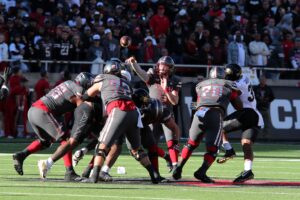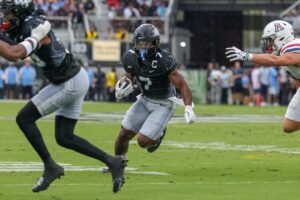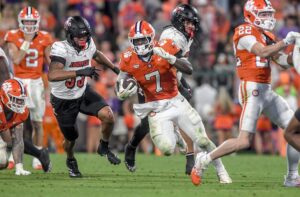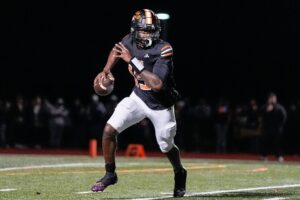Cade McNown was already a legend in the minds of most UCLA fans. Going 4-0 against USC gets you lofty status. But McNown’s legacy is etched forever. Last Word had a one-on-one with the newest version of the former quarterback. We talked with UCLA’s Cade McNown, Hall of Famer.
McNown was inducted into the college football hall of fame, by the National Football Foundation, earlier this week in ceremonies in Las Vegas. He is UCLA’s 17th inductee into the NFF hall of fame, and the first since John Sciarra was inducted in 2014. He was actually part of the 2020 induction class. But the ceremonies were cancelled last year due to Covid, so they were included with the 2021 class they year.
The Unexpected Start
He took over as the starting four games into his freshman year in 1995. First Ryan Fien went down. Then Rob Walker. The true freshman from Linn, Oregon was next. He had been recruited by head coach Terry Donahue. But offensive coordinator Bob Toledo was the one who sold him the vision of what was possible.
The Bruins were 2-1 when McNown became a starter. It was a position he would never relinquish through the rest of his career in Westwood. UCLA finished 4-4 in the Pac-10 and 7-5 overall, beating Kansas in the Aloha Bowl.
His sophomore season did not go as well. Toledo was the new head coach after Donahue’s retirement. Al Borges was running the offense now. “It was kind of a rebuilding year,” according to McNown. Mostly the Bruins were breaking in a new offensive line. They were 4-4 in conference play again, and 5-6 overall. But the offensive line, with guys like Kris Farris, Andy Meyers, and others were cementing their place in front of McNown for years to come.
The Legend Begins
McNown’s junior year is when the legacy began to unfold. “We had something really special my junior year,” McNown said. The Bruins started 0-2 with losses to Washington State and Tennessee. They won the next 10 in a row, finishing in a tie for the conference lead with Washington State. Since the Cougars had beaten UCLA, Washington State got the Rose Bowl bid. The Bruins went to the Cotton Bowl where they beat Texas A&M. In his interview with Last Word, McNown said they, “Went out in style with that game.” He added the secret to the 10-game win streak was, “Not any more complicated than the next play, and that is all you can focus on.”

The 10-game win streak grew to 20 in 1998. The Bruins were winning with a high-powered offense again. The difference between the two seasons was that in ’97 while the offense was putting up an average of 43 points per game, the defense was holding teams down. In ’98, the defense was not even close to being that effective, and so the 43 points per game were needed again from the offense and the games were much closer.
None the less, the win streak climbed to 20. McNown said, “I never set out, like let’s go win 10 in a row or 20 in a row. For me, it was just an attitude of like, ‘We’re not going to let this team beat us,’ whoever that was that day,” he said. “We’re not going to let this team ruin our season.”
Miami, 1998
No one who knows their UCLA football history does not know what happened on December 5th, 1998. The game against Miami had been scheduled for the season opener in September. Hurricane Georges put a stop to that. UCLA did not have to re-schedule the game. At 10-0, there were some questions as to whether it was beneficial to do so. Since they were in line, with a win, to play in the first ever BCS championship game, UCLA agreed to play it in December, on the day other conferences were playing their championship game.
Edgerrin James ran roughshod through the UCLA defense, run for one year by Nick Aliotti. There were plays in the red zone where the Bruins didn’t even have 10 defenders on the field. The Bruins lost in the closing minutes of the game, 49-45. It cost them a shot at the national title. When told UCLA fans still sting from that loss 23 years later, McNown said, “Understandably.” He threw for more than 500 yards and five touchdowns. He ran for another. It good enough to make up for defensive lapses
McNown was philosophical about such a momentous loss. “We should all be so fortunate to remember our losses much more clearly than our wins, because it means there were fewer of them,” he said with a laugh. “But they still sting.” McNown said it did not take as long as some might think for him to get over the loss. “In many ways I got over it right away. It stings and then you’ve got to get ready for the bowl game.”
While the Bruins lost out on playing for the national championship, they did go to the Rose Bowl as Pac-10 champions. Unfortunately, they played Wisconsin. The defense had a repeat of what happened with James, this time with Badgers running back Ron Dayne.
The Miami Game In Perspective
Still reflective about the loss to Miami, McNown said he looked for the upside. “In a weird, bittersweet way, had we won that game, I never would have been able to play in the Rose Bowl game. Playing in the Rose Bowl is one of the things I treasure,” he said. “It turned out to be the best game offensively I ever played.” McNown passed for 340 yards, the fourth-highest total in Rose Bowl history, in the 38-31 loss. The Bruins also set a-then-record of 538 yards of total offense. UCLA has not been close to playing for the national title, or being in the Rose Bowl since that Miami game.
But while McNown is philosophical about the Miami loss in early December, he still slips into specific memories of it. Later in the interview, he said, “It turned out to be the best game offensively I ever played.” He referred to turnovers as the problem. That includes the one Bruins fans haven’t been able to shake for more than two decades, the Brad Melsby fumble. “His knee was down. Everybody knows it. But there was no instant replay,” he said. “Maybe the college football world can thank us for pushing everybody over the edge to have instant replay. So, I guess we took one for the team that day.”
The NFL

McNown finished his senior year as a Heisman finalist, Pac-10 offensive player of the year, consensus All-American, and the winner of the Johnny Unitas Award. He was the 12th overall pick in the 1999 NFL draft by the Chicago Bears. He was on the cover of ESPN The Magazine along with Akili Smith, Donovan McNabb, and Daunte Culpepper as the future quarterback stars of the league. McNown started most of two seasons in Chicago, while underperforming statistically. He was traded to Miami, and then again later to San Francisco. McNown was released in 2003 by the 49ers. He turned down an offer by Calgary of the Canadian Football League.
Life After Football
McNown moved on from football and began his professional career in finance. He first worked for UBS, then JPMorgan Chase Private Bank. In 2013, McNown joined capital management firm, Lourd Murray as a vice president. Since 2016, he has been with Kayne Anderson as a senior managing director.
With his background in finance and wealth management, he has been paying particular attention to one of the newest facets of the college game; Name/Image/Likeness, or NIL. He is in favor of the players being able to monetize their marketability. But he could not come up with an answer when we asked what skill he had that would provide NIL revenue if they had it while he was at UCLA. Still, he is concerned that there is a money grab for the athletes, with little proper guidance from those around them.
NIL
“I would not be surprised if the whole thing gets re-tooled in some way,” he said. “As is often the case, there are a lot of unintended consequences.” He pointed out the likelihood of players making more money than they imagined without being ready for the other side. “It’s tough sometimes for an 18-year-old to have a lot of money. With that comes the potential for a lot of credit. That comes with borrowing capacity. With that comes a lot of debt.” He said he believes few college players are ready for the tax implications that come with their newfound income. “A lot of these guys are being set-up, unintentionally, for real bad long-term financial circumstances.” He said he expects to see some guard rails put into the system in the coming years.
Legacy Honored
He remains UCLA’s all-time leading passer. “I am a reflection of all the effort put in by my teammates,” he said.
In 2009, McNown was inducted into the UCLA Athletics Hall of Fame. In 2017, he was inducted into the Rose Bowl Hall of Fame. Tunnel 8 at the Rose Bowl bears a plaque in his honor for his college accomplishments at the stadium.






